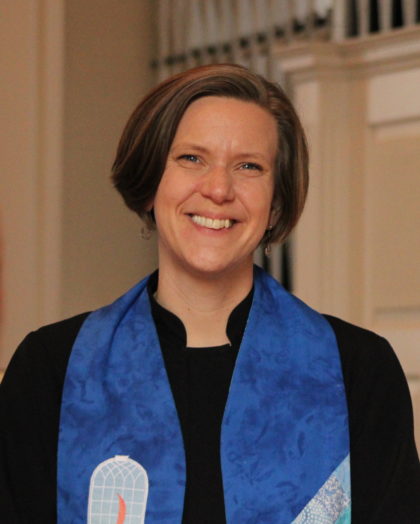Guest Post by Harry Purkhiser, Stewardship Team Chair
I’m Harry Purkhiser and as leader of the Stewardship Team this year, I’d like to spend just a couple of minutes talking to you about stewardship. At it’s core stewardship is the acceptance of responsibility to shepherd and safeguard the valuables of others.
We meet here in this beautiful sanctuary because of the generosity and stewardship of generations of our spiritual ancestors who were living out their values.
In his “History of the First Unitarian Society in Dunstable, Now Nashua, 1826-1926,” Leonard Freeman Burbank writes, “On September 11, 1826, The First Unitarian Congregational Society in Dunstable was formed by eighty-seven men signing a document that is the first evidence of our existence. Many of the signers were among the most prominent men in the village and to them present day Nashua is indebted for much that is worthwhile in our city…” According to Burbank, these men were driven not just by the need to form a fellowship, but the need to express in Nashua the emerging liberal Christianity that was becoming known as Unitarianism.
Funds for the construction of the building we sit in now were raised through the auctioning of pews. According to the account, 49 pews were sold for prices varying from 20 to 100 dollars and were subject to a yearly tax ranging from four to 13 dollars. Daniel Abbot was the largest purchaser, buying seven pews. They were probably the one hundred dollar pews. On June 27, 1827, this sanctuary was dedicated. Mr. Burbank records that the cost to build the church and to ordain the first minister was $4,154.85.
Over a hundred years after its founding, our church’s ancestors made another great leap of faith and stewardship. The Parish House was completed in 1929 at a cost of $41,724.18 for the building, and $5,097.55 for the furnishings–a major undertaking for the church in a time of great economic turmoil. But it also represented a major step forward in meeting the needs of the congregation and the surrounding community. It added space and facilities for meals, social gatherings, dances, lectures, and stage productions. It also provided space for Sunday School classes, church youth programs and meetings, and for meetings of many community organizations.
The third great expansion of our facilities occurred in 1959 with the dedication of the new education building. This expansion was made possible by several large donations, along with the proceeds of the sale of the First Universalist Church and Parsonage, with whom the Unitarians had merged in 1957. Mr. David Hamblett, President of the church, in accepted the keys to the new building noted that the building represented a trust from the past and an obligation to the future.
Our fine sanctuary has gone through several minor and a couple of major renovations. After a major painting and redecoration effort in 1964, Don Rowley made the following remarks. “The changes we have made here may reflect something of our present thought. We have sought dignity through refined simplicity. We have sought more light, for light is a symbol of truth. And in these changes the democratic spirit and a sensitivity to the feelings of others have prevailed. Each of these says something significant about the nature of the Unitarian Universalist Church of Nashua in the year 1964. But let us remember in this hour that the Church is no isolated thing. It is not something apart, nor an island unto itself. It does not belong to this time alone. It belongs to ages past and to generations yet to come.”
Don wasn’t speaking about the church as the physical buildings we inhabit, but the church as an institution, the receptacle that holds the essence of our thoughts, our values, our love of community that inhabits us.
Our ancestors have indeed left us beautiful physical facilities which deserve our stewardship. But what about the institution? Will future generations look back at our stewardship of our church as an institution with appreciation? How do we as current stewards and future ancestors, ensure that there is a liberal religious institution in Nashua for generations yet to come?
The Stewardship Team believes its role is to promote within our church family a sense of responsibility for the sustainment and growth of the institution of our church through increased generosity of time, talent, spirit, and money, in consonance with our values and in support of our mission.
Just as our ancestors reached for loftier goals, so should we. Future generations depend on it.
Thank you.

